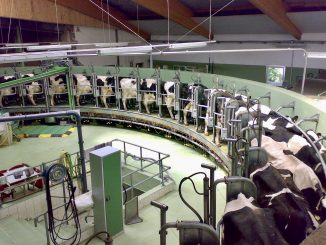
The European Court of Auditors examined farmers income stablisation in a recent report. The findings were mixed, with direct payments, insurance, mutual funds all part of what was assessed. Many measures have failed to live up to expectations, with auditors finding limited evidence of their effectiveness. What’s more, the uptake of these payments was found to be uneven, inefficient and, in some cases, unfair. And in some cases public aid and insurance may even be prolonging unsustainable practices. Natasha Foote has more.
We’ve all been there. An unexpected bump in the road, an extra bill to pay, a stroke of misfortune- no matter how well organised you are, even the best laid plans sometimes go awry.
But while this is something we’re all familiar with, for farmers an unexpected expense can sound the death knell for their livelihoods – and, along with them, our food security.
Farming is an inherently precarious profession, one that is dependent on ever-shifting and volatile situations, be that unforeseen weather events, the spread of a disease or sudden shifts in the market. Inconvenient and untimely problems therefore tend to come along much more often in the farming world.
And this is a tendency that is likely to get worse over the coming years. According to the European Environment Agency, crop losses in the EU as a result of extreme weather conditions are in danger of increasing, including risks of flooding and desertification .
Considering the challenges of our changing climate, there is an urgent need to evaluate and develop strategies to address losses following climate events. It has therefore never been more important to develop a resilient farming that is able to withstand knocks.
Using the CAP to Create a Resilient Agricultural Sector
This is why the EU’s common agricultural policy (CAP) contains a range of measures whose specific purpose is to guarantee a stable and adequate income for farmers.
This is achieved largely through direct payments, which are paid to over six million farmers across the EU each year, accounting for €41 billion annually.
However, as well as these direct payments, the CAP also includes specific instruments dedicated to the prevention and management of risks and crises in the agricultural sector, such as falling prices and production losses.
These include farmers insurance and mutual funds, which can be used to stabilise farm income. There are also exceptional measures which are intended to stabilise the market as a whole in the event of serious disturbance, such as when Russia decided in 2014 to ban certain agricultural imports from the EU.
While this is all very well and good in theory, the question is how does this play out in reality?
That’s exactly what the European Court of Auditors looked into in their recent report on farmers income stablisation.
The group was tasked with looking in depth into whether these tools were being implemented efficiently and delivering results. They focused in particular on the EU’s support for insurance and the exceptional measures introduced for the fruit and vegetables sector following the 2014 Russian sanctions.
The report found that the CAP offers a comprehensive range of instruments which serve to increase farmers resilience.
In particular, the report highlighted that direct payments play a significant role in safeguarding farmers incomes, noting that on average they account for a quarter of farm income and allow farmers to cope better with unpredictable circumstances.
The auditors also acknowledged that the CAP is increasingly working to promote preventive measures, especially by encouraging farmers to adopt good agricultural and environmental practices, although they noted that evidence of the impact of these on farmers’ behaviour is lacking.
Falling short of expectations
However, while it all sounds positive up to this point, the report didn’t find only good news.
“We found that the Commission does not collect relevant information to monitor the use of risk management instruments” ECA Report on Income Stabilisation
In fact, the report found that many measures have failed to live up to expectations, with auditors finding limited evidence of their effectiveness. What’s more, the uptake of these payments found to be uneven, inefficient and, in some cases, unfair.
One of the major areas for improvement highlighted in the auditor’s conclusions surrounded insurance. It was found that the majority of the €2.6 billion earmarked by the EU to help farmers insure against price volatility and production losses has had little impact.
This was explained by the fact that the money reaches a very small share of farmers, with the report finding that fewer than 10 % of those who insure do so with EU support.
Furthermore, it was found that most farmers do not even consider mitigating risk as they expect to receive substantial public aid anyway in case of a crisis.
In addition, EU support for insurance was not found to be adequately targeted to those in real need of it. For instance, in the two Member States making most use of it (Italy and France), the auditors noted a disproportionate amount of support was being lent to the wine sector. This is despite the fact that in this sector, where insurance can reach €115 000 per hectare, many beneficiaries, given their financial capacity and risk profile, would have chosen to insure their production regardless of EU subsidies.
Also worryingly, the report found that insured farmers may have less incentive to apply a resilient business strategy or adapt to climate change.
Their conclusion was therefore that the EU agricultural risk management instruments and crisis measures only partially met their objectives and, when they did meet them, they did not always achieve this in an efficient way.
“we could not confirm that products withdrawn from the market were actually removed either because of a lack of traceability or because these products came back onto the market in a different form, for example processed into juice.” ECA Report on Income Stabilisation
The main recommendations outlined to the Commission involves encouraging farmers to better prepare for crisis and a better design and monitoring of support for insurance, the criteria for recourse to exceptional measures and compensation for withdrawal operations.
Measures like these can play a crucial role in the creation of a more preventive and resilient EU agriculture, so the news that they are failing to live up to their expectations ultimately means they are also failing our farmers and the safeguarding of our farming systems – and that is something we should all be concerned about.
The report can be found here Special Report_CAP_Income_stabilisation
More on the ECA
ECA report & 5 Member States Disrupt Commission’s Cosy CAP Communication Plans
ARC Exclusive – Auditors Heavily Criticise Commission’s CAP Plans





